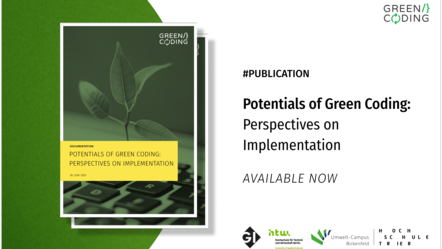New publication sheds light on the state of sustainable software development in industry
In a new publication, the Green Coding project team looks at whether Green Coding approaches are being applied in the software industry and how they are being implemented.
The information and communications technology (ICT) industry has experienced significant growth in recent decades. This growth has brought with it an increased focus on the carbon footprint of the ICT sector and the importance of resource and energy efficient software. The information and communications technology (ICT) industry has grown rapidly in recent decades. With this growth, concerns around the sector's carbon footprint are also rising. Increasingly, there is a desire for resource- and energy-efficient software, or Green Coding for short. However, there are different interpretations and terminologies around Green Coding and sustainable software. This leads to challenges: in implementing specific measures during the development process and in communicating their strategic advantages and disadvantages. In the newly published paper, the Green Coding project team explores the question of whether green software development concepts are already being applied in the software industry and what challenges and conditions for success exist with regard to implementing sustainable development processes.
To answer this question, a survey and a workshop with representatives of the software industry were conducted over the course of the project, which provided many important insights. Only about 17% of the respondents said that their company does enough to reduce the environmental impact of their software and about 75% said that there is untapped potential for more sustainability in the software development process. The topic is more relevant than ever, and it is clear that Green Coding is becoming increasingly important in business. For example, about half of the software companies surveyed said they consider Green Coding a strategic goal, but currently only about 18% of companies actively measure the environmental impact of their software.
"To prevent the phenomenon of greenwashing in the software development process, where resource and energy efficiency are recognized as selling points without significant environmental benefits, it is crucial to widely disseminate and make accessible methods and tools for measuring the environmental impact of software products, including their energy consumption, while introducing standardized measurement units." says Carolin Henze, responsible for the project on the part of the Gesellschaft für Informatik e.V. (German Informatics Society).
These and other findings can be read here.
The project Potentials of Green Coding is a cooperation of the German Informatics Society e.V., the HTW Berlin and the Environmental Campus Birkenfeld of the Trier University of Applied Sciences and is funded by the Internet Society Foundation over a period of 18 months. For more information on the project, visit https://gi.de/en/aktuelles/projekte/en-green-coding


